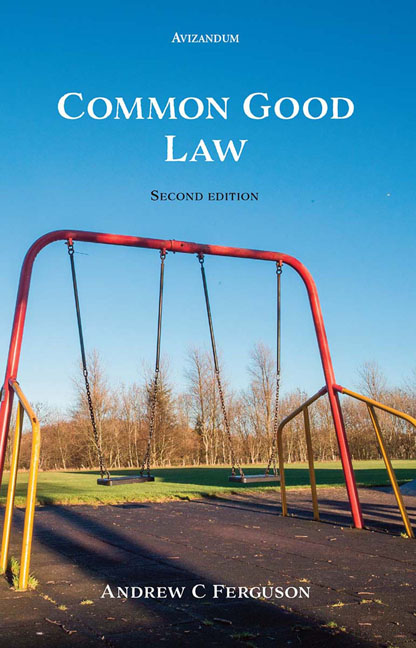Book contents
- Frontmatter
- Contents
- Preface
- Tables of Legislation
- Table of Cases
- 1 Origins and Definitions
- 2 Statutory Framework
- 3 The Administration of the Common Good
- 4 Inalienable Common Good Property
- 5 Classification of Common Good Land
- 6 Appropriation, Alienation and Disposal of Common Good Land
- 7 When Does ‘a Question’ Arise?
- 8 Factors Involved in Allowing Disposal
- 9 Taking a Common Good Case to Court
- 10 Common Good and Community Empowerment
- Appendix I List of Burghs
- Appendix II Disposal, Appropriation and Alienation
- Index
9 - Taking a Common Good Case to Court
Published online by Cambridge University Press: 20 October 2020
- Frontmatter
- Contents
- Preface
- Tables of Legislation
- Table of Cases
- 1 Origins and Definitions
- 2 Statutory Framework
- 3 The Administration of the Common Good
- 4 Inalienable Common Good Property
- 5 Classification of Common Good Land
- 6 Appropriation, Alienation and Disposal of Common Good Land
- 7 When Does ‘a Question’ Arise?
- 8 Factors Involved in Allowing Disposal
- 9 Taking a Common Good Case to Court
- 10 Common Good and Community Empowerment
- Appendix I List of Burghs
- Appendix II Disposal, Appropriation and Alienation
- Index
Summary
Petitions under section 75
Section 75 of the Local Government (Scotland) Act 1973 allows local authorities to take petitions for appropriation or disposal of land forming part of the common good either to the Court of Session or the sheriff court.
So far as the Court of Session is concerned, the provisions governing petitions can be found in Chapter 14 of the Rules of Court. Normally, such petitions would be dealt with, in the first instance, in the Outer House. In the majority of modern cases concerning disposal which have come before the Court of Session, the court has either ex proprio motu, or at the instance of the parties, appointed a reporter to investigate the facts and revert to the court with a report setting out the factual position. The reporter is normally an advocate of some standing who has experience in matters of this kind. The advantage of this procedure is that it cuts down on the amount of court time, and therefore expense, taken up with hearing facts which are clearly not in dispute.
Finally on the Court of Session, rule 34 provides for a report by the Lord Ordinary to the Inner House for a ruling on any matter of particular complexity. This is what happened in the South Lanarkshire Council case, where the case was put out for a hearing before a Division of the Inner House on the summar roll.
In the sheriff court, such guidance as there is can be found in the current Sheriff Court Ordinary Cause Rules. The general practice in sheriff court actions does not appear to be to appoint a reporter. Where the action is defended, it is more likely that a hearing will be fixed on evidential matters.
There is nothing in the 1973 Act or elsewhere to guide a local authority as to whether it should take the case to the sheriff court or the Court of Session. On the one hand, having the case heard locally before a sheriff who might have knowledge of the area may have some advantages. The most obvious advantage is a saving on cost for all concerned.
- Type
- Chapter
- Information
- Common Good Law , pp. 132 - 140Publisher: Edinburgh University PressPrint publication year: 2020



